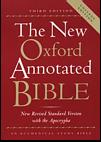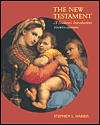Grading of Weekly
Quizzes: Failure to your record name on the answer sheet is
minus
10 points. Both your name printed plus your signature are required
on the quiz answer sheets. No grade will be recorded in the grade book
with both.
As a department requirement, a Pre-Test
and a Post-Test will be administered at the
beginning and at the end of the semester. The Pre-Test does not count toward
the semester grade, but the Post-Test will count 5% of the semester grade.
See the Semester Grade section below. These tests
contain 50 objective questions over the subject field of New Testament,
and are not linked to any particular textbook. As a department requirement,
the professor merely administers the test for the department and has no
control over the content of the tests. The tests are secured and thus are
not available for the students to examine. The department is required to
develop and administer these tests by the SACS accrediting agency.
Summer Terms:
-
In the summer
term day classes,
four major exams will be given on the dates specified in the Schedule page
under Your Choices on the left. No weekly quizzes will be given.
-
In the G.O.A.L.
night classes meeting twice weekly during the summer terms, four major
exams will be given as specified in the Schedule page under
Your Choices
on the left. No weekly quizzes will be given.
Before
every major exam each student, during class roll-call,
will indicate to the professor the chosen exam format option from the three
possibilities listed below:
-
(1)
A short answer/objective question exam of 100 answers (to be taken at the
scheduled exam time.) The databank containing these questions can be accessed
by clicking on the
 icon by each chapter in the List of Topics page.
icon by each chapter in the List of Topics page.
-
(2)
An essay exam of five questions chosen from a pool of questions provided
at exam time by the professor (to be taken at the scheduled exam time).
The grading of these exams will be on the basis of thoroughness, accuracy
and depth of reflection on the topic.
-
(3)
Turn in at the scheduled time of the exam a previously prepared essay exam
answering all the Study
Questions as defined in the Topics for
the Study of the New Testament. From this page use the hyperlinks to
the subdirectories containing the questions for each chapter of study identified
by the
 icon;
simply click on this icon to access these.
icon;
simply click on this icon to access these.
-
A minimum of 1/4 page of single-spaced
typed answer must be given to each question, using the Times-Roman (New
Times-Roman) 12 pitch font.
-
A minimum of 33 questions
per
test period (20 questions during summer
terms) must be completed from the pool of possible questions in
the appropriate sections of the Topics for the Study
of the New Testament.
No more than one question
per topic number must be included in the chosen questions; a variety of
types
of questions must be utilized as well.
-
The questions to be answered are those
from the topics covered in class from the previous Exam.
-
The format of this exam option must include
(1) the question (in bold face print) including the topic reference number
and (2) your answer (in normal print).
-
The nature of this option is such that
the student should begin working on it outside of class at the beginning
of the time period for the material on that exam.
-
Failure to turn
in this option for the exam at the scheduled exam time means one letter
grade per day counted off the possible score!
-
This exam option
is to be completed by the individual student working independently from
other students past or present. Copying previously submitted answers or
working with another student pooling the work constitutes cheating and
a serious violation of the Code of Honor signed by each student at enrollment
in GWU. Such students will face disciplinary action by the university.
-
The answers MUST
NOT be copied directly from the materials in the textbook or designated
sources. The student is to reflect on the answer and express in his or
her own words the appropriate answer to the questions!
-
-
Once the choice
is made during the class roll-call, no changing of the option will be possible.
If the student is absent from class on the day of roll-call option determination,
he/she will automatically be assigned option number 1.
-
The Basis of testing
for
the weekly quizzes and the major exams (all three options) will be the
topics defined in the Topics for the Study
of the New Testament. The sources of information to study in preparation
for the tests include in their order of importance: (1) class discussion
notes and (2) the Study Questionson
the range of topics covered in class during the specified test period.
Make-up
Tests:
Before a make-up test will be administered,
approval from Dr. Cranford must be secured. The exclusive basis for granting
permission to take a make-up test is an excused absence from the class
period when the quiz or exam was given. Without an excused absence, there
is no need to request a make-up! Your request
for a make-up MUST be submitted a minimum of 48 hours in advance of the
requested make-up time.
For weekly quizzes and major exams,
missing a class period when test is given will mean a grade of zero for
that quiz or exam until the make-up test is successfully completed. Important
note: a make-up quiz or exam is ONLY possible with an excused absence!
An unexcused absence means that a grade of zero will be calculated into
the semester grades without recourse to making up the missed test! NOTE:
all make-up major exams, but not quizzes, will automatically be an option
2 essay exam.
If your feel that you have an excused
absence and are thus entitled to take a make-up test, then complete correctly
the
online request
form and submit it to Dr. Cranford within one week of the date of the
regularly scheduled quiz or exam. Dr. Cranford reserves the right to demand
verification of the nature of the absence if deemed necessary. Note that
the make-up text will most likely be an entirely different and more difficult
test than the one administered at the scheduled class period. Once this
request form has been evaluated and approved, you will be notified by e-mail
of the scheduled time and place for the make-up.
These must
be scheduled during either my office hours or those of my student assistant.
Check my Office Hours before submitting request.
Make-up tests, which are missed, will
be taken within two weeks of the regular test. Once the two week limit
has expired no make-up is possible. Permission to take make-ups shall
be given ONLY to those with justifiable reason for missing the regular
exam (by university policy, only: athletic contests, emergencies, illness
or bereavement).
Each student needing a make-up exam needs to secure
permission from the professor in advance of the scheduled make-up exam
by completing the Request
for Make-up Test form. The form must be approved by the professor
before the make-up can be scheduled; approval will be sent to the student
via his/her e-mail address
Passage
Analysis:
The student in all three forms of the
course will do the appropriate research and prepare for submission a formal
(i.e., fully documented using
Turabian, 6th ed., as the style guide)
research paper consisting of a 'critical analysis' of an assigned passage
from the New Testament. The paper is to be ten pages double spaced.
-
The assignment is divided into three parts
with separate due dates:
*Translation
Analysis
-
Due by 5:00 pm on
Friday of the week of Exam 1.
-
Counts as 25% of
paper grade
-
Papers turned in
late for any reason will be penalized as follows: (1) first week, up to
minus 10 points; (2) second week, up to minus 20 points; (3) after two
weeks, paper unacceptable.
*Analysis
of Secondary Sources
-
Due by 5:00 pm on
Friday of the week of Exam 2
-
Counts as 25% of paper grade
-
Papers turned in
late for any reason will be penalized as follows: (1) first week, up to
minus 10 points; (2) second week, up to minus 20 points; (3) after two
weeks, paper unacceptable.
*Completed
Paper
-
Due by 5:00 pmon
Friday of week 15 of the regular terms; week 5 of the summer terms.
-
Counts as 50% of
paper grade
-
Papers turned in
late for any reason will be penalized as follows: (1) first week, up to
minus 10 points; (2) second week, up to minus 20 points; (3) after two
weeks, paper unacceptable.
-
Each of the above
assignments may be turned in by either a Print Copy or Electronic Copy.
-
For specific details
on turn in procedure, see the class Bulletin Board
for the week that each assignment comes due.
See GUIDELINES
FOR DOING THE ANALYSIS PAPER for specific instructions. The paper will
count the same value as a major exam. For help on the Turabian style guide,
see the internet web site,
CITATION
STYLE FOR RESEARCH PAPERS, among numerous URLs that provide information
about the details for formatting with Turabian. Other sites on Turabian
can be found by doing a search using TURABIAN at the major search engines
such as Yahoo, AltaVista etc. All necessary information about the Turabian
guidelines needed for this assignment are found in the Guidelines
For Doing the Analysis Paper.
In the summer
terms, the difference in grade calculation will be as follows:
(1) No weekly quzzes nor quize average will be factored in. (2) For the
day classes, a fourth major exam will take the place of the weekly quiz
average. Thus each will count the 17% as indicated above. (3) For the G.O.A.L.
classes at meeting two nights each week, four major exams will be given.
See chart below for specifics.
The adjusted average of the above numerical
grade will then be converted into a letter grade according to the following
curve: A = 90-100; B = 80-89; C = 70-79; D = 60-69; F = below 60. The
numerical grades are not rounded off!
Note the following
illustration of the above:
Grade
Sources: |
Regular
Semester |
Summer
Term |
| Exam 1 |
17% |
17% |
| Exam 2 |
17% |
17% |
| Exam 3 |
17% |
17% |
| Exam 4 |
----- |
17% |
| Quiz Avg |
17% |
----- |
| Paper |
17% |
17% |
| Post-Test |
5% |
5% |
| Class Participation |
10% |
10% |
| Semester Avg: |
=100% |
=100% |
After each major exam, at mid-term of
regular terms, and before the final exam, each student will receive an
individualized Grade Report listing his/her grades and the semester average
to that point in the course, as well as the class averages. Information
about the semester grade or final exam will be available from the professor's
office soon after the final exam in the form of Grade Report Five.
University Policy
for an Incomplete Grade:
An ‘I’ grade may be assigned only when
a small amount of coursework (i.e., test, project, research paper, or final
exam) is not complete. The student should contact the professor about the
possibility of an “I” grade. The reason for the incomplete work must
be of a serious nature and must be beyond the student’s control. The assigning
of an ‘I’ grade must be accompanied by the completion
of an ‘I’ Grade contract, with
one copy given to the student, one kept on file by the professor, and one
submitted to the Associate Provost within seven days after grades are submitted.
The student must complete the coursework by the date provided by the professor.
The professor should submit the change of grade form no later than 90 days
after the last day of the term in which the ‘I’ grade was assigned, or
earlier, as indicated on the form.
Definition
of Academic Dishonesty:
Academic Dishonesty
is the deliberate and knowing misrepresentation of one's academic work.
A student is dishonest when two circumstances occur: (1) The student could
reasonably be expected to know that his/her professor would disapprove
of some aspect or circumstance of the student's academic work; and (2)
the students submits work to the instructor for evaluation while hiding
that particular aspect or circumstance from the instructor. To do so is
clearly dishonest because the instructor will evaluate the work as what
he/she understands it to be. The student has deceived the instructor by
misrepresenting the work, and the evaluation has not been rightly earned.
From another perspective, academic dishonesty may be viewed as the use
of unauthorized assistance in any work which is to be evaluated--"unauthorized"
meaning that the professor would not approve of the form of assistance
received and is unaware of its use. The student is being dishonest if he/she
deliberately hides this assistance from the instructor while knowing the
instructor would not approve of this assistance. If the instructor is unaware
of the assistance that has been received he/she will evaluate the work
as being entirely the student's own. Thus, the evaluation has not been
fairly earned by the student. Furthermore, any student who knowingly gives
unauthorized assistance is also guilty of academic dishonesty. On tests
and examinations academic dishonesty occurs when a student receives any
assistance that the professor has not expressly permitted. It may take
the form of looking on another student's test paper or bringing into the
test site any information or materials not expressly permitted by the professor.
Both of the above definitions of academic dishonesty apply: The student
has misrepresented the test as being entirely his/her own work. Furthermore,
the student has received unauthorized assistance.
On research papers,
reports and other written assignments a form of academic dishonesty is
plagiarism, which is the use of someone else's
information or exact words without properly "documenting" or identifying
that source. Whenever someone else's exact
words are used those words must be properly punctuated as a quotation and
the source fully identified. Also, any information or ideas which have
been taken from a source other than the student's own personal knowledge
– book, article, interview, etc. – must be properly documented, even though
the student may be rephrasing the information in his/her own words. A student
should not hesitate to consult the professor about any question or uncertainty
regarding proper documentation of research information. A professor may
often allow and even encourage students to work together on assignments
or receive assistance from other students, other faculty members, other
university staff members, friends, family or others. However, if the professor
has not expressly allowed such assistance and expects the assignment to
be done entirely by the student, to do otherwise would be dishonest. The
student should consult the professor if there is any doubt about outside
assistance being allowable....
The examples above
are not intended to be a full list of cases of academic dishonesty, but
they illustrate the definition. Ultimately, academic dishonesty amounts
to deliberately hiding something from the professor. So the best advice
is this: Whenever in any doubt, consult the professor."
In addition to
the bringing of charges against the student for academic dishonesty and
plagiarism as outlined in the paragraphs following the above quote in the
Student Handbook, the university authorizes each professor to set additional
policies not less strengent, but more strengent than the above stated policy.
In this class, the following policy will be strictly enforced:
The minimum
penalty for cheating or plagiarism will be a zero for the work submitted.
Violations of an egregious or repeated nature may, upon investigation,
result in the offender's receiving an F grade for the entire course.
Please remember
that the purpose of an honor system is not to seek out cheaters, but to
ensure the integrity of the hard work that each of you will be contributing
to this course. Good, honest students deserve to have their hard
work and preparation protected against the rare individual who hopes to
slide by on someone else's efforts.
 Metzger, Bruce M., and Roland E. Murphy, eds.New
Oxford Annotated Bible with the Apocrypha, College Edition: New Revised
Standard Version (NRSV), 3rd revised edition New York: Oxford
University Press, 2001. (Required)
Click
on GWU Campus
Shop to order books directly from the university.
Metzger, Bruce M., and Roland E. Murphy, eds.New
Oxford Annotated Bible with the Apocrypha, College Edition: New Revised
Standard Version (NRSV), 3rd revised edition New York: Oxford
University Press, 2001. (Required)
Click
on GWU Campus
Shop to order books directly from the university.
 ---Harris,
Stephen L., The
New Testament : A Student's Introduction. 4th ed. Mountain View,
CA: Mayfield Publishing Company, 2001.Click on
GWU Campus Shop
to order books directly from the university.
---Harris,
Stephen L., The
New Testament : A Student's Introduction. 4th ed. Mountain View,
CA: Mayfield Publishing Company, 2001.Click on
GWU Campus Shop
to order books directly from the university.
 Students
are expected to attend all class periods. University policy will allow
no more than 25% absences from this course. This
means a maximum of 11absences for classes meeting three times each week;
7 absences for one meeting twice; and 4 evenings (or 9 class sessions)
for one meeting once weekly. Note also: absences due to officially
sponsored activities, such as athletic contest will count toward the maximum
allowable number of absences but will not be factored into the grade adjustment.
Each student is responsible to notify the professor of the reason for each
absence to determine whether it is an excused absence; until the online
Request
for an Excused Absence form is filled out and approved for each class
absence, every absence will be considered an unexcused absence, thus substracting
5 points from the Class Participation Grade. The
Class Participation grade (up to 10% of semester grade) is predicated primarily
on unexcused absences(- 5 pts), excused absences (- 1 pt), tardies (-3
pts), leaving class early (-2 pts), sleeping in class (-3 pts), participation
in group assignments (+ 2 pts), answering oral questions in class (+2 pts),
etc. Points ranging from 1 to 5 are deducted for every negative activity
defined in the preceding sentence!
Students
are expected to attend all class periods. University policy will allow
no more than 25% absences from this course. This
means a maximum of 11absences for classes meeting three times each week;
7 absences for one meeting twice; and 4 evenings (or 9 class sessions)
for one meeting once weekly. Note also: absences due to officially
sponsored activities, such as athletic contest will count toward the maximum
allowable number of absences but will not be factored into the grade adjustment.
Each student is responsible to notify the professor of the reason for each
absence to determine whether it is an excused absence; until the online
Request
for an Excused Absence form is filled out and approved for each class
absence, every absence will be considered an unexcused absence, thus substracting
5 points from the Class Participation Grade. The
Class Participation grade (up to 10% of semester grade) is predicated primarily
on unexcused absences(- 5 pts), excused absences (- 1 pt), tardies (-3
pts), leaving class early (-2 pts), sleeping in class (-3 pts), participation
in group assignments (+ 2 pts), answering oral questions in class (+2 pts),
etc. Points ranging from 1 to 5 are deducted for every negative activity
defined in the preceding sentence!

